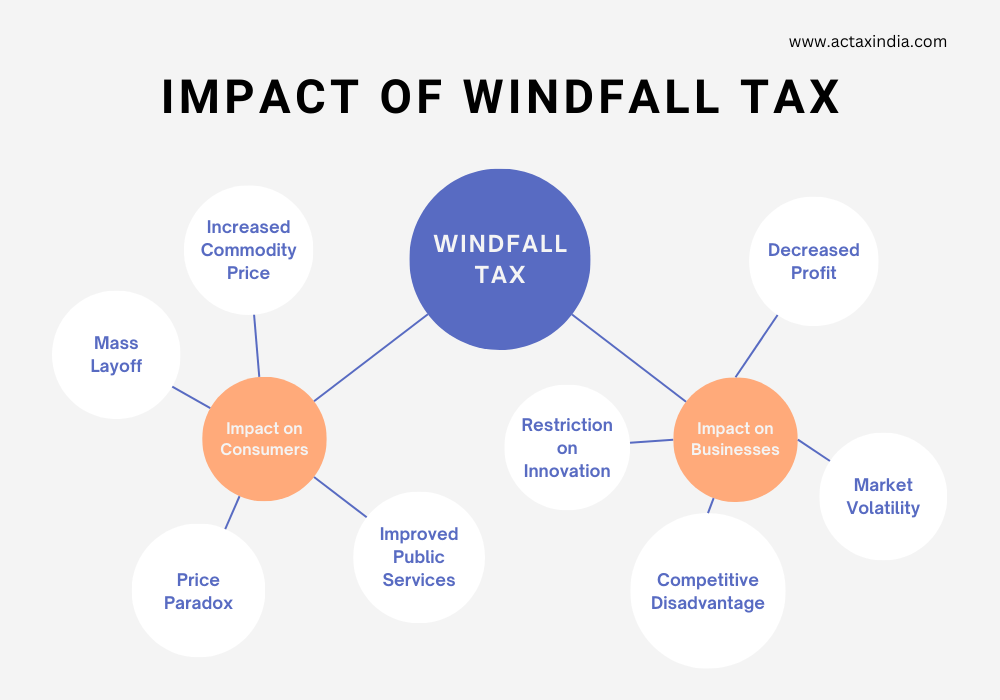Windfall tax, a relatively new taxation policy, was introduced in India in 2022. Since then, there has been a constant argument regarding how it is going to impact the Indian business landscape as well as the society at large. In this regard, this blog has covered everything you need to know about windfall tax and how it has impacted India.
Table of Contents

What is Windfall Tax in India?
Windfall tax refers to the tax levied by the government, on account of an unexpectedly above-average profit, generally assumed to have been obtained unfairly. It is a one-time tax imposition. These are generally incurred against financial windfalls.
How does the Windfall Tax work? Why is it imposed?
In general parlance, windfall taxes are incurred against entities that gain way too advantageously from sources like lottery, property, stock market, and so on. Unexpected price rises in commodities can also lead to such abnormal gains. The core principle of windfall tax lies in the fact that such abnormal gains should be equally distributed. That means, in real life, the businesses or entities that gain unexpectedly should ideally be reinvesting such gains for societal development, be it scientific discovery or infrastructural development.
Windfall taxes are usually imposed over the regular tax rates (i.e., windfalls are not deemed as a strategized event). They are typically calculated as a “percentage of the excess profits”. The tax further works as a deterrent for those companies and entities that would leverage the advantages of unforeseen profits unjustifiably. Through the equal distribution of wealth (i.e., by levying the windfall tax), sustainable development can be promoted.
Impact of Windfall Tax on the Consumers and Businesses
The impact of windfall tax is highly volatile. However, some critical assumptions have been made hereunder.
Impact on Consumers
Increased Prices on Commodities:
Businesses can easily increase the price of their products and services, due to the psychological loss incurred from the passing of the windfall tax. This may compel the customers to settle for a higher price rate only, especially in a monopoly.
Mass Layoff:
In case the businesses experience a loss due to the levying of windfall tax, they may opt for mass layoff to cut costs. Apart from that, it can also result in a reduced employment rate. This, eventually, has the potential of negatively impacting the customers, who rely on jobs or employment for income.
Price Paradox:
In an oligopoly or monopolistic competition, the market competition is usually high, and the businesses might struggle to keep their impact on the market share. To stay competitive and relevant in the market, these organizations or businesses might lower their prices, after the blow of incurred windfall tax.
Improved Public Services:
Evident from the purpose of a windfall tax, it can be assumed that the Government will equally distribute the wealth and invest the same for the improvement of public services, eventually benefitting the consumers, who designate the general population.

Impact on Businesses
Indirect Restriction on Innovation:
There is a general presumption surrounding windfall tax, that it tends to restrict innovation. To be precise, big businesses often find it futile to invest in innovative projects, as they feel that a giant success might come along with a huge amount of profit, which will eventually be levied by the Government by the virtue of windfall tax.
Competitive Disadvantage:
Countries like Canada and South Korea are yet to adopt windfall taxes, hinting towards a competitive advantage those native organizations can have, in comparison to the organizations that are subjected to windfall tax, as per the law of the land (i.e., refers to the countries having windfall tax).
Market Volatility:
Market volatility is probably the most dominant impact of windfall tax. Businesses can experience a sudden surge of profit (i.e., due to the financial windfall), and the next moment, a certain decrease in such profit can unfold gradually, backed by the charges of the windfall tax. The businesses or industries, undergoing this process, also remain volatile with their pricing strategies, as mentioned previously. They can either increase their prices or decrease them, depending on the market competition.

Advantages of Windfall Tax
Evolution of Windfall Tax in India
The concept of windfall tax was introduced in India back in the 1970s. However, they became functional not until the 2000s, when the Government of India levied a windfall tax on the profits of the oil companies. Again, in 2008, the Government of India tried to impose windfall taxes on the Indian oil companies, when the global oil prices escalated to an amount of US$100/barrel. But, the Indian Government failed to provide any concrete rationale behind it.
Ultimately, in the recent past, the windfall tax was legalized in India, in the aftermath of the Russia-Ukraine war. A research study revealed that “the Russia–Ukraine war resulted in a $37.14 increase in WTI crude oil prices, reaching 52.33%, and a $41.49 increase in Brent crude oil prices, reaching 56.33%”. This phenomenon was leveraged by the crude oil producers of India, to enhance their profitability quotient. As a result, India introduced the windfall tax, with a concrete rationale on July 1, 2022. The motion came into effect on September 1, 2022. Since then, windfall taxes are typically levied in India for diesel and gas. It is done so that India can seamlessly meet the energy shortages.
To further break it down, previously the Indian oil companies heavily exported their products and as a result, seamlessly generated magnanimous profit. Because of this advantage, these companies ended up depriving the domestic market of India (i.e., of affordable oil). The incorporation of the windfall tax enabled an equilibrium because the oil producers became conscious of excessive profitability.
Since 2022, the structure of windfall tax kept on changing due to market volatility and price fluctuations. In January 2024, the Government of India reduced the windfall tax, especially on crude petroleum to ₹1,700/tonne from ₹2,300/tonne. But, again in February 2024, windfall tax took a hike from ₹3,200/tonne to ₹1,700/tonne.
Impact of Windfall Tax in India: ONGC, Oil India, GAIL
Indian oil companies like Oil India, GAIL, and ONGC used to experience substantial profits before the introduction of the windfall tax. The Government of India leveraged this (as mentioned earlier), and captured a share of the profit for themselves. This resulted in the generation of significant Government revenue, benefitting the country as a whole (through estimated development, be it in the healthcare sector or infrastructure). On the other hand, the continuous fluctuations in the windfall tax ratio facilitated volatility for the above-mentioned oil companies. As of 2024, the profit margins of the Indian oil companies have dropped significantly.

Target Industries of Windfall Tax
The mining, gas, and oil industries are mainly targeted in this regard, as they are often seen to be making a huge amount of profit from natural resources (i.e., naturally occurring substances are owned by everyone). To further break it down:
Mining Industry:
The primary reason behind the charge of windfall tax against these industries can be traced back to the fact that mining companies leverage natural resources to generate profit. Natural resources are essentially public property. Hence, if any unexpected gain is generated through them, then such gain is also the right of the general public. Factors like commodity price surges, the discovery of a geographically concentrated mineral resource, and limited competition lead to frequent gains within the industry. The Chilean Government charges windfall tax via the “mining royalty tax”, wherein the lithium mining sector is made to pay a certain amount of money against their profits (precisely 5% to 14%, as of 2023).
Oil and Gas Industry:
Just like the mining industry, the oil and gas industry also leverages natural resources for their profits. Sometimes, demand surges for oil and gas results in a price hike, further facilitating unexpected profits. For example, the “Oil Market Report” of 2023 revealed that the world oil demand increased from 2.3 mb/d to 101.7 mb/d in 2023 itself, highlighting the abnormal demand surge. As a result, the respective Governments of the most prominent oil industries of the world charge windfall tax against such profits. India has recently implemented a “windfall tax on crude oil producers” for this very reason, as of 2022.
Read this – 7 benefits of company registration for startups,
Pharmaceutical Industry:
The COVID-19 Pandemic authenticates the phenomenon of windfall tax against the pharmaceutical industry. The invention of the COVID-19 vaccination paved its path, because of its high demand, backed by the fact it is being delivered for public service. Two key points must be understood here. Firstly, the pharmaceutical industry was exposed to a huge profit margin, backed by the surged demand for vaccines, which were then categorized as a necessity item. Secondly, the financial pressure of the situation (i.e., to increase the worldwide medical capacity), pushed the government to gather up more finances. As a result, the authoritative bodies found a way to get such funds by charging windfall taxes from the pharmaceutical companies. For example, in 2021, Germany charged windfall tax from the vaccine success of BioNTech.
Telecommunications Industry:
In certain rare cases, the telecommunications industry is also exposed to windfall tax. It occurs when the sector is granted some special license that yields unexpected profits. For example, the Reliance Industries of India gets hugely impacted by windfall tax. In 2023, the company’s overall profit fell nearly 15%, due to the charges of windfall tax.
The core advantages of windfall tax are:
Increased Government Revenue:
As discussed earlier, windfall revenue results in increased government revenue. This revenue, if leveraged properly can be used for infrastructural development or public service investments.
Overall Economic Contribution:
Windfall taxes manifest the overall economic well-being of a country. In other words, it promotes sustainable economic growth, backed by the concept of distribution of wealth.
Fair Distribution & Sustainable Development:
Windfall taxes ensure the fair distribution of wealth, and in cases of any imbalance, it uniforms the system through permeation. This phenomenon enables sustainable development, wherein the weaker section of the society gets uplifted through the surplus finances of the stronger section.
Price Stabilization:
Windfall taxes curb excessive profit, eventually enabling tax regulations and price stabilization. Consumers can significantly benefit from it because a stabilized price rate allows proper financial planning.
Government Debt Clearance:
By leveraging the revenue that comes from the windfall tax, the Government can clear off national debts, if there are any. This can smoothen the national economy.
Deterrence against Concentration of Wealth:
Windfall taxes deter the concentration of wealth and promote financial equality and freedom. This phenomenon is ideal for a welfare state.
Disadvantages of Windfall Tax

Promotes Arbitrary Taxation:
The concept of windfall tax in itself promotes arbitrary taxation, wherein the Government arbitrarily leverages its power to generate revenue for themselves, out of the profit made by some other entity. It defies the principles of liberty.
Market Uncertainty:
Windfall taxes promote market volatility, wherein businesses or industries cannot justifiably presume their pricing strategy. In other words, the associated businesses or competitors end up in a tough spot, as it becomes impossible to detect whether the affected organization is going to higher or lower their price.
Reduced Business Profits:
As mentioned earlier, it is obvious that windfall taxes reduce business profits. This, in turn, negatively impacts the entire business performance.
Repels Investors:
The phenomenon of windfall tax, in itself, repels investors, as it generates uncertainty (i.e., even with profitability, the company can run at a loss) for them. This is a risk that no investor wants to take.
Competitive Drawbacks:
Simply speaking, countries without windfall tax enjoy a competitive advantage over countries with windfall tax. This is because the organizations or companies of the former countries will never run at a loss while experiencing an above-average profit.
Misuse of Power:
At times, the Governments misuse their power and generate revenue from windfall taxes in the name of societal betterment, but end up using them elsewhere.
Conclusion - Windfall Tax: A Boon or A Bane?
Windfall Tax is neither an absolute boon nor an unequivocal bane. It comes with its own set of pros and cons. However, it would be suggestible that the levy of windfall taxes should be done in moderation. Excessive high rates can disrupt the business ecosystem of a country, especially in a capitalistic economy. In the context of India, it can be said that the success of windfall tax depends on various external factors. Firstly, it is essential to keep a tab on how the Government is using the revenue. Secondly, the tax rate should be adjusted as per the market conditions. Thirdly, excessive volatility in structural changes should be avoided, to maintain a healthy equilibrium. Follow Actax India for more blogs related to taxation.



